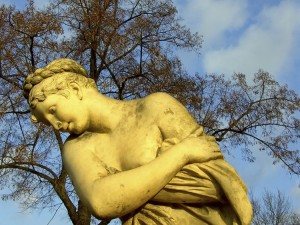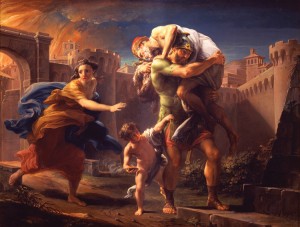Mythic Monday: Amorous Aphrodite
Monday, January 16th, 2017January 16, 2017
When it comes to matters of the heart, Aphrodite reigns supreme in Greek mythology. Aphrodite was the Greek goddess of love and beauty. The Romans, who named their gods and goddesses after planets and stars, called her Venus. Aphrodite was the daughter of Zeus, the king of the gods, and the goddess Dione. According to some myths, when Aphrodite was born, she rose full-grown from sea foam. The name Aphrodite may come from the Greek word aphros, which means foam.

This photograph shows a statue of Aphrodite, the goddess of love and beauty in Greek mythology. Aphrodite plays a role in many myths, often starting love affairs among mortals. Credit: © Thinkstock
In ancient Greece, Aphrodite wore many hats, so to speak. For instance, the Greeks worshiped her as a universal goddess called Urania, which means queen of heaven. She was also worshiped as a goddess of civic life called Pandemos, which means goddess of all people. Some Greeks considered Aphrodite to be the goddess of seafaring and warfare.
According to mythology, Aphrodite delighted in instigating love affairs between the gods and mortals—affairs that often included her. She was married to Hephaestus, the blacksmith of the gods, but Aphrodite had many lovers among the gods, as well as among mortal men. Her lovers included Ares, the god of war, and the mortal Anchises, a Trojan prince with whom she had a famous son, Aeneas. Her most famous lover, however, was the handsome and youthful mortal Adonis. Aphrodite was so attracted by his good looks that her jealous husband, Hephaestus, disguised himself as a boar and killed Adonis. Supposedly, a flower called the anemone sprang up either from Aphrodite’s tears over the death of Adonis or from the handsome mortal’s spilled blood. Even today, the red anemone is considered a symbol of the death of a loved one, or of forsaken love.



